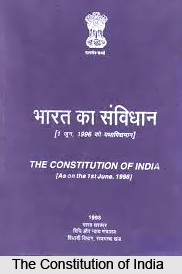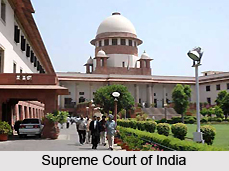 Fundamental Duties in India are guaranteed by the Constitution of India in Part IVA in Article 51A. These fundamental duties are recognized as the moral obligations that actually help in upholding the spirit of nationalism as well as to support the harmony of the nation, as well as of the citizens. These duties are designed concerning the individuals and the nation. However, these fundamental duties are not legally enforceable. Furthermore, the citizens are morally obligated by the Constitution to perform these duties. These Fundamental Duties were added by the 42nd Amendment Act in 1976.
Fundamental Duties in India are guaranteed by the Constitution of India in Part IVA in Article 51A. These fundamental duties are recognized as the moral obligations that actually help in upholding the spirit of nationalism as well as to support the harmony of the nation, as well as of the citizens. These duties are designed concerning the individuals and the nation. However, these fundamental duties are not legally enforceable. Furthermore, the citizens are morally obligated by the Constitution to perform these duties. These Fundamental Duties were added by the 42nd Amendment Act in 1976.
Article 51-A of the constitution provides 10 Fundamental Duties of the citizen. These duties can be classified accordingly as relating to the environment, duties towards the state and the nation and also towards self. However, the main purpose of incorporating the fundamental duties is to encourage the sense of patriotism among the country`s citizens.
The international instruments, such as, the Universal Declaration of Human Rights and International Covenant on Civil and Political Rights include reference of such fundamental duties. These Fundamental Duties are such commitments that expand to the citizens as well as the state at large. According to the Fundamental Duties, all the citizens should respect the national symbols as well as the constitution of the country. The fundamental duties of the land also intend to uphold the right of equality of all individuals, defend the environment and the public property, to build up scientific temper, to disown violence, to struggle towards excellence and to offer compulsory education. In addition, the 11th Fundamental Duty of the country was added in the year 2002 by the 86th constitutional amendment. It states that every citizen who is a parent or guardian, to offer opportunities for education to his child or, as the case may be, ward between the age of 6 and 14 years.
Fundamental Duties of Indian Citizens are as follows -
* To abide by the Constitution and respect its ideals and institutions, the National Flag and the National Anthem;
* To cherish and follow the noble ideals which inspired our national struggle for freedom;

* To uphold and protect the sovereignty, unity and integrity of India;
* To defend the country and render national service when called upon to do so;
* To promote harmony and the spirit of common brotherhood amongst all the people of India transcending religious, linguistic and regional or sectional diversities; to renounce practices derogatory to the dignity of women;
* To value and preserve the rich heritage of our composite culture;
* To protect and improve the natural environment including forests, lakes, rivers and wildlife and to have compassion for living creatures;
* To develop the scientific temper, humanism and the spirit of inquiry and reform;
* To safeguard public property and to abjure violence;
* To strive towards excellence in all spheres of individual and collective activity so that the nation constantly rises to higher levels of endeavour and achievement
The Fundamental Duties of Indian citizens serve an imperative purpose, as a democratic polity cannot succeed if the citizens refuse to assume responsibilities and duties and are not enthusiastic to be active participants in the process of governance. The Fundamental Duties are considered as the responsibilities which should be performed by each and every civilian of India.




















